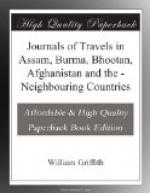February 1st.—First part of last night clear; but the wind shifting from west to north-east, has again thoroughly clouded the sky, night beautifully clear, no rain, and no wind during the day.
2nd.—A windy but clear night, succeeded by a beautiful morning, wind as usual, north-east or thereabouts, i.e. down the river.
I have seen it mentioned somewhere, that in arid climates the only support of vegetable life exists in the dews, which are hence, at least in the cases alluded to, supposed to be providential adaptations to supply certain deficiencies. But considering that dews consist of nothing but a deposition of moisture: it follows that in very arid climates, as there is no moisture, so there can be no dews. For the deposition of a dew, the fist essential thing, is moisture, either in the ground or in the air, this last may have been derived from the ground. If neither the ground nor the air contain moisture, no dews can exist, this is the case in Khorassan.
Throughout the whole campaign no dews were noticed, although the nights were almost uniformly serene and calm, and the time chosen for marching, would have certainly brought us in contact with them had they been deposited. Dews therefore do not form in Khorassan, with these exceptions, that wherever from the nature, and the level of the soil, water was found very near the surface, dews were deposited; as on the Chummums or low marshy pasturages at Candahar, Cabul, etc.
But even these were trifling, the aridity of the air being too great as compared with the small extent of Chummums, to allow the deposit of any considerable portion of the moisture it had derived from the ground.
So that aridity, instead of being adapted to dews, is a serious obstacle to their ever appearing. With the rarity of dew, that of hoarfrost which is nothing but frozen dew, may be associated; nor does hoarfrost often occur, because in Khorassan it rains in the winter too freely, particularly in all such places whose elevation is not sufficient to cause the formation of snow, and hence where other circumstances are favourable for hoarfrosts, they are too much watered as it were, and seldom occur. With extreme aridity, Khorassan unites extreme electricity, the casual friction of woollen cloths, especially those of camels’ hair being accompanied by discharges sufficiently startling. The same thing happens when caressing dogs or horses. I could never fill the barometer without experiencing a shock as the mercury approached the bottom end of the tube, which (when nervous) used to endanger it.
It is this extreme aridity that gives Khorassan so rich a spring flora, this season being that of rain, of melting of snow, and the ground being well moistened.
It is this extreme aridity that necessitates the abundance of bulbous plants in Khorassan, these deposits of nutrition existing even in several of its Compositae.




